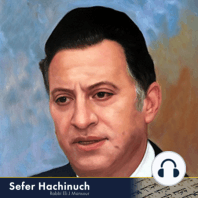20 min listen
Misva #350: The Laws of Erchin – Pledges to the Temple Treasury
FromSefer Hachinuch
ratings:
Length:
20 minutes
Released:
Dec 21, 2022
Format:
Podcast episode
Description
The Torah in Parashat Behukotai (Vayikra 27:2) introduces the law of “Erchin,” a type of pledge which a person makes to the treasury of the Bet Ha’mikdash (called “Bedek Ha’bayit”). If a person pledges “Erki” – “my value,” then he must pay to the Temple treasury the value stipulated by the Torah here in Parashat Behukotai. The Torah assigns different sums for different groups of people, depending on age and gender, and one who pledges his or her “Erech” must make the payment specified by the Torah for that person’s gender and age group. This case differs from the case of one who says “Dami Alai,” pledging his value as a servant. In the case of “Dami Alai,” one pays the sum for which he or she would be sold as a servant based on the current market value of people of his or her age, appearance and physical condition. In the case of “Erchin,” however, appearance and physical condition are of no relevance, as the price is set by the Torah based solely on age and gender. The Sefer Ha’hinuch explains that the notion underlying this Misva, to fulfill one’s verbal commitments, is the unique importance of the faculty of speech. As the Sefer Ha’hinuch emphasizes, verbal communication is what distinguishes human beings from all other creatures. The Torah in Parashat Bereshit (2:7) tells that when G-d created Adam, He placed within him a soul, and Adam became a “Nefesh Haya” (literally, “living spirit”). Targum Onkelos translates this phrase as “Ru’ah Memalela” – “a speaking spirit.” Speech is the defining quality of the human being, an expression of the soul which only we, and no other creature in the universe, possess. When we speak, we are, in essence, exercising the soul. For this reason, we must treat our speech with utmost respect, and this includes fulfilling all verbal commitments. The Torah requires fulfilling verbal commitments not only in regard to Misva matters, such as pledges to the Bet Ha’mikdash and to charity, but also in regard to mundane, everyday matters. The Sages warned, “Lo Yeshaneh Adam Be’diburo” – that a person must not deviate from what he says, and must instead follow through on all his pledges. If a person pledges money to the treasury but cannot afford to fulfill the pledge, Bet Din would seize his possessions. Fulfilling pledges is so important that Bet Din would even seize a Torah scholar’s books if this is necessary for him to pay the sum he had pledged. The only exception is the text of the Masechet which he currently studies, which is left for him to use. The Sefer Ha’hinuch explains that this exception is made out of Kevod Ha’Torah (respect for Torah). Bet Din would sell the seized property and use the money for fulfilling the pledge. If they seize Metaltelin (moveable property), the items are sold right away, and in the person’s location. Bet Din does not delay selling them in the hope that their market value will go up, or bring them to a different region where they could be sold for a higher price; instead, they are sold immediately. In the case of real estate, however, Bet Din advertises the property for sixty days in order to get the best offer, and then the money is given to the treasury. This Misva applies to both men and women, and it applies at all times, even nowadays, when there is no Bet Ha’mikdash. Of course, nowadays one should not be making pledges to the Bet Ha’mikdash, but if one did, then he has an obligation to fulfill his pledge. If he consecrated food for Temple treasury, then he sets it aside and lets it spoil. Similarly. if he consecrated utensils, then he waits for them to break or otherwise be ruined. If he consecrated coins or metal, they should be discarded in the Dead Sea, where they will be ruined. If he consecrated an animal, then the animal is locked up until it perishes. Another opinion, that of Shemuel, maintains that one transfers the sanctity of the consecrated money or object onto a coin, and then this coin is cast into the Dead Sea. One who fails to fulfill his pledg
Released:
Dec 21, 2022
Format:
Podcast episode
Titles in the series (100)
Misva #10: The Obligation to Eat Masa: Daily Sefer Hachinuch - Brought to you by itorah.com by Sefer Hachinuch
